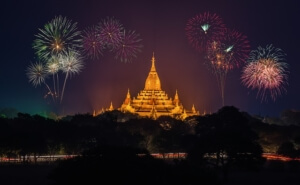The Origins of New Years

Origins of New Year’s, history of New Year’s, New Year traditions, New Year’s Eve, calendar origins, Babylonian New Year, January 1st, cultural traditions, global New Year celebration
The Origins of New Year’s: Uncovering the History Behind the Celebration
New Year’s is celebrated worldwide, but where did this tradition originate? The origins go far beyond the turning of a calendar page. From ancient Babylon to modern-day festivities, New Year’s has evolved through countless changes. Let’s explore its fascinating history and how it became the global celebration we know today.
The Beginnings: Babylonian New Year Celebrations
The first known celebrations of New Year’s began over 4,000 years ago in Babylon. In Babylon, the New Year was celebrated around the **spring equinox** in late March. This marked the start of the agricultural cycle, symbolizing renewal and hope. The Babylonians held the **Akitu Festival**, a 12-day event, during which rituals were performed to honor their gods. These early customs laid the foundation for many New Year’s traditions.
During this festival, the Babylonians enacted the mythical battle between gods and crowned a new king. This was a time for feasts, music, and community bonding. These practices influenced the way we celebrate the new year today, particularly in terms of feasts and communal gatherings.
The Shift to January 1st
While the Babylonians laid the groundwork for the holiday, the shift to **January 1st** as the official start of the year happened later. In 46 B.C., **Julius Caesar** introduced the **Julian calendar**, aligning it with the sun. January 1st became the start of the year to honor **Janus**, the Roman god of beginnings, gates, and transitions.
Janus was depicted with two faces, one looking forward and the other backward, symbolizing reflection on the past and anticipation for the future. This dual symbolism influenced how we celebrate the beginning of a new year. Later, the **Gregorian calendar**, introduced in 1582, solidified January 1st as the global starting point for the year.
The Spread of New Year’s Celebrations Worldwide
The adoption of January 1st as the new year’s date spread through Europe and beyond. As the Roman Empire expanded, so did the calendar. However, New Year’s Day wasn’t always celebrated on January 1st. In medieval Europe, some regions observed different dates, such as **March 25th**, the **Annunciation of the Virgin Mary**.
In China, the **Chinese New Year** follows the **lunar calendar** and is celebrated between January 21st and February 20th. This holiday is one of the most important cultural events in China, involving family gatherings, feasts, and traditional practices like giving red envelopes filled with money for good luck.
External Resources for Deeper Learning
Jordan Maxwell | Ancient World Mysteries
Modern New Year’s Traditions
Today, New Year’s is a global celebration marked by a wide variety of traditions. While some customs differ, many focus on reflection, renewal, and community. One universal tradition is the countdown to midnight, followed by fireworks, parties, and music.
In the United States, **Times Square in New York City** hosts one of the most famous New Year’s Eve celebrations. The **ball drop** has been a part of the tradition since 1907, and millions of people around the world watch it on TV. In Spain, people eat **12 grapes at midnight**, one for each month of the coming year, symbolizing good luck.
In **Denmark**, people celebrate by throwing old dishes at the doors of friends and neighbors, symbolizing the removal of bad luck and the welcoming of new beginnings. Another common tradition worldwide is **making New Year’s resolutions**, a practice that dates back to the ancient Babylonians, who made promises to their gods for a better year.
The Spiritual and Cultural Significance of New Year’s
For many, New Year’s carries spiritual and cultural significance. It serves as a time for **reflection** on the past year and **renewal** for the future. The celebration is more than just a countdown—it’s about starting fresh, setting goals, and looking forward with hope.
In some cultures, New Year’s is seen as a spiritual event. It is a time to reflect on past mistakes, seek redemption, and set a course for the future. This sense of renewal continues to resonate with millions of people as they mark the changing of the year.
Conclusion: A Global Celebration
The origins of New Year’s have evolved from ancient Babylonian rituals to the modern-day global celebration we enjoy today. What began as a festival tied to the changing of the seasons has transformed into a time of reflection, renewal, and hope. Across cultures, New Year’s remains a powerful symbol of fresh beginnings and new opportunities.
To learn more about the origins of cultural holidays and traditions, visit JordanMaxwellVideos.com.



